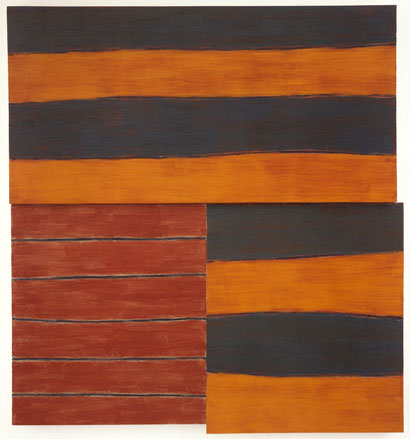Sean Scully
dal 7/1/2009 al 13/2/2009
Segnalato da
7/1/2009
Sean Scully
Timothy Taylor Gallery, London
Paintings from the 80s. This exhibition explores how the artist renewed the legacy of minimalist abstraction with the reintroduction to painting of the poetic, the metaphoric and the referential.

Timothy Taylor Gallery is delighted to present an exhibition of paintings by Sean
Scully from the 1980s.
Rejecting the meticulous and precise gridded paintings he made in the 1970s,
Scully’s work took a dramatic turn in the early 1980s. This exhibition explores how he
renewed the legacy of minimalist abstraction with the reintroduction to painting of the
poetic, the metaphoric and the referential. With hindsight, this determined
commitment to abstraction places Scully directly in an unbroken historical continuity
with the grand trajectories of high modernism, from Mondrian through to the later
poetry of Rothko.
The 1980s saw Scully adopt passionate earthy colours combined with hand-drawn
lines and stripes, dense yet luminous brushwork suggesting layers of paint with
enticing glimpses of the ground beneath. Using ordinary house painting brushes
Scully built up broad panels and stripes, working wet on wet, their handworked
quality suggestive of fragility and fallibility. As Sue Hubbard has so rightly observed,
‘the humanity of imperfection is woven into the painting’s fabric.’
The revolutionary impurity of Scully’s practice at this point is manifest in The Bather,
1983, in which the central panel clearly suggests a human figure, while the adjoining
panels in sensuous black and green inescapably conjure a natural world of terrible
beauty. These works are about differences and similarities, the clash and
awkwardness of small disparities of scale or depth, and unexpected colour
combinations, such as the mysterious elision of black and midnight blue in Swan
Island, 1982. Scully himself has described his paintings as personalities – suggesting
they can be deciphered and understood to an extent, but ultimately remaining
mysterious and unknowable.
The 1980s are also Scully’s most sculptural period; works such as Red Earth, 1985,
Heat, 1984, and The Bather, 1983, have a monumental physical presence. All are
composed of interconnecting panels, projecting into or receding from the space of
the viewer. Scully has said of these works that he liked the idea of paintings that you
could not look at in one go, that you had to walk around to see properly, and their
three-dimensionality and object-hood is unmistakable. These collisions of panels are
all part of ensuring that Scully’s painting, despite its lofty aspirations, is very much
connected with the real world. As Scully has observed, ‘it is physicality in art that
keeps it connected, affirms its connection and its dependence on the real world, on
life, on ordinary life.’ Scully’s great achievement, realised for the first time in these
great works is the reinvigoration of abstract painting with the metaphorical, the
philosophical and the sublime, simultaneously delighting the viewer with the primitive
and visceral power of pure paint. Ultimately these paintings demonstrate how
Scully’s art has probed the very nature of human existence - its pleasure, pain and
paradox.
Born in Dublin, Ireland, in 1945, Sean Scully moved to London in 1949. He studied at
Croydon College of Art, London, (1965-68), and Newcastle University (1968-72),
before moving to the USA in 1975 where he became an American citizen in 1983.
Recent solo exhibitions have included: Sean Scully: A Retrospective, curated by Danilo
Eccher (touring), Fundació Joan Miró, Barcelona; Musée d'Art Moderne de Saint
Etienne Metropole and MACRO al Mattatoio, Rome, (2007/2008). Recent group
exhibitions have included: Masterpieces of Modern British Art: Selected works from the
Derek Williams Trust and Amgueddfa Cymru National Museum Wales, Osborne
Samuel Gallery, London, UK, (2008) and Big Juicy Paintings (and more): Highlights
from the Permanent Collection, Miami Art Museum, Miami, Florida and the Metropolitan
Museum of Art, New York (2006/2007). In May 2006, a permanent room dedicated to
Sean Scully opened at the Hugh Lane Gallery in Dublin and in October of this year he
was honoured by the New York Studio School of Drawing, Painting and Sculpture.
Scully's work is held by numerous public collections including The Metropolitan
Museum of Art, The Museum of Modern Art, and Solomon R. Guggenheim Museum,
New York; The Corcoran Gallery of Art and Hirshhorn Museum and Sculpture Garden,
Washington; Modern Art Museum of Fort Worth, Texas; Tate Gallery, London;
Louisiana Museum of Modern Art, Denmark; Museo Nacional Centro de Arte Reina
Sofia, Madrid and Fundació La Caixa, Barcelona
Breakfast Preview 8 January 2009 | 8.30-11am
Timothy Taylor Gallery
21 Dering Street - London
Open 10-6pm Mon-Fri; 10-1pm Sat.
Free admission



